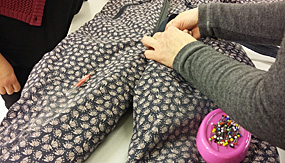
© Japa Ry
The aim of the City of Jyväskylä is to promote a consumer-oriented circular economy. The project coordinated by Jyväskylä is looking to find new solutions for ordinary consumers to live in a more resource-conscious way promoting recycling, sharing and reuse through small day-to-day choices.
The city has turned to consumers and residents to discover new practices related to preventing waste generation, reducing waste amounts, promoting sorting and reusing waste, for example. In addition to this, various opportunities for shared use and the sharing economy are being sought after, along with innovative ideas with service and business potential.
Highlighting the best ideas through an open proposal process
About every two years, the city organizes an open process through which residents can submit ideas. A panel of experts selects 6–7 ideas from each round for implementation as fast trials lasting no longer than a month. A maximum of 7,000 euros in funding is reserved for each trial within the scope of the project. A total of 18–21 different trials are conducted over the course of the entire project.
In selecting the best ideas for the trials, the panel focuses on measurable efficacy for change, as well as the viability of each idea for expansion, transfer and duplication.
The following ideas were selected for trials in the first round of idea submissions
- Plastic collection trial for housing companies
- Introduction to biogas vehicles
- “Recycling container” for student buildings
- Equipment borrowing application
- Touring repair and chat workshop
- Cleaning day 2.0
- Service for turning garden waste into soil
During the project, the intention is to expand at least eight of the trials to other parts of Finland, with at least one being taken up abroad. Another goal is to reduce the amount of residual waste in the trial area by about 20%. The city is also trying to change attitudes and behaviors among residents to be more favorable to the circular economy.
Schedule
Current